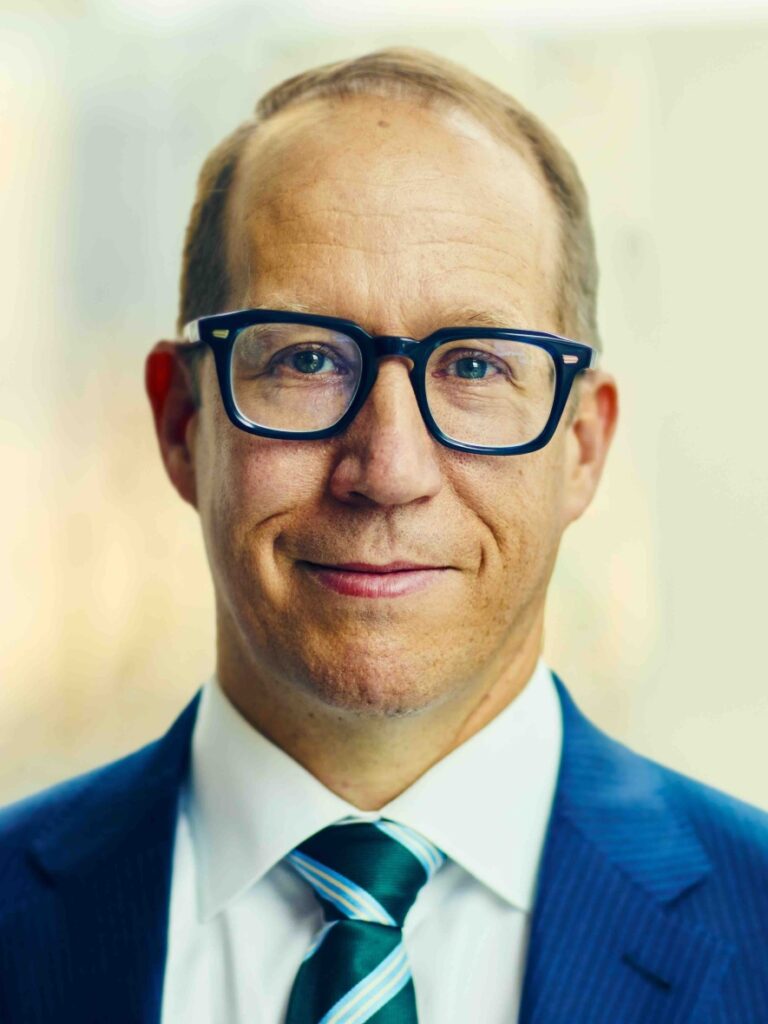Neil Paris was once a talented basketball player. As an undergraduate student in philosophy at Brock University, he played shooting guard for the school team. In the early 2000s, as an associate in the litigation group at Osler, Hoskin & Harcourt LLP, he joined a competitive men’s league for former varsity athletes. Work took precedence, though, so he frequently skipped games. “After three years, I didn’t get asked back to the team,” he recalls. “I immediately understood why.”
In fact, he largely saw that outcome as inevitable. At the biggest firms on Bay Street, Paris explains, annual billable-hour targets tend to sit between 1,700 and 1,900. His was 1,750, but, like many young lawyers at prestigious firms, he aimed to impress, so he tried to exceed that number. To meet such a lofty goal, he had to deprioritize other commitments. “Friends learned that I couldn’t be counted on to show up,” he says. “They stopped asking me to things.”
At Osler, Paris loved litigation. He also practised with terrific colleagues. But he was never all that proficient at business development, which made it difficult to move up the Bay Street hierarchy. “The evenings spent wining and dining just weren’t my thing,” he says. In 2014, he left Big Law to launch his own firm in downtown Toronto: Paris & Company P.C. (now Paris & Sayer LLP), a small shop focused on corporate commercial litigation.
Initially, work was scarce. “I spent a lot of time sitting nervously by the phone,” says Paris. Then his former firm started to send files his way. “Osler does big-ticket litigation matters, worth hundreds of millions. When they got leads on smaller matters, they would put my name forward instead.” Soon, Paris was billing between 1,200 and 1,300 hours per year. “These weren’t big Bay Street numbers,” he says. “But I wondered, Do I really need more?”

“Big Law isn’t for everyone,” says Neil Paris. “If you want work-life balance, there should be a place where you can go, without taking an in-house position or leaving the profession entirely.”
For most leaders in the upper reaches of the industry, the answer is yes: a successful firm must have sky-high targets. Lawyers learn their trade by practising it, hour after gruelling hour. It’s only by subjecting associates to punishing work weeks that senior partners can identify the real soldiers. Plus, top talent is expensive. Billable hours turn into the money you need to cover the competitive salaries that skilled lawyers expect. All of this, at least, is the conventional wisdom.
Paris believes that the big Bay Street model—long hours and lavish salaries—works well enough, at least for certain people. Some litigators are machines in human form: they live and breathe the law and survive on little sleep. But there are other, equally talented lawyers who do their best work when they’re well rested and living a balanced, burnout-free life. As for salaries, some lawyers aim to make as much money as possible; others would gladly take a reduction in pay for a comparable reduction in work. “Big Law isn’t for everyone,” says Paris. “If you want work-life balance, there should be a place where you can go, without taking an in-house position or leaving the profession entirely.”
Over time, Paris has tried to build such a place. Today, his nine-lawyer operation has an annual target of 1,200 billable hours. Paris estimates that his associates make about 20 percent less than they’d make at a bigger shop, but they do roughly 30 percent less work, which means they’re earning more money on a per-hour basis. Importantly, the lower target hasn’t impeded the firm’s ability to take on the kind of complex files that passionate litigators crave. Unburdened from a massive target, associates sometimes have the capacity to read journal articles or books in the firm’s modest library, a rare opportunity for any young litigator.
Paris runs the firm alongside Denise Sayer, the second named partner, who joined the firm back in 2016. Sayer also started her career at Osler, where she met and worked with Paris. Then she moved to a leading litigation boutique. “Professionally, I was in a great place,” she recalls. “But I felt stretched, trying to meet clients’ demands and still get time with family.” One December, about a decade ago, she worked through Christmas, a decision that her two boys, now aged 14 and 12, still talk about, all these years later.
Shortly after that non-holiday, Sayer was having lunch with Paris at a Thai restaurant downtown, when he made a pitch to her: “Come work with me. We’ll do things our way.” She accepted and hasn’t looked back.

Denise Sayer, a partner at Paris & Sayer, is pictured here in the firm’s downtown office.
Since joining up with Paris, Sayer has put meaningful time into her relationships with friends and family. She’s also had the opportunity to nurture her hobbies—yoga, crafting, knitting. The freedom to pursue these interests, she reasons, is itself a kind of perquisite. She rarely works weekends, and she manages her time so that she only needs to keep tabs on work over Christmas. Only a true client emergency would interrupt the holidays in a significant way. Like Paris, Sayer stresses that there’s nothing intrinsically wrong with working long hours. She simply wants her firm to offer an alternative. “It’s all about having options,” she says.
When Liam McNeely, an associate at Paris & Sayer, first started at the firm in 2017, he was fresh out of law school and eager to prove himself the way young lawyers often do: by racking up long hours in the office. Paris saw what was happening and quickly intervened. “One night, he literally told me to go home,” says McNeely. Paris wasn’t only protecting his employee’s time; he was safeguarding firm culture. “Neil doesn’t want his associates competing for who can stay the latest,” says McNeely. “P&S isn’t that kind of place.”
If a lawyer puts in an intense month or two on a case—as litigators sometimes must—Paris encourages them, afterwards, to slow down and take a vacation. When the sheer volume of work at the firm increases, such that the team would have to surpass its 1,200-hours-per-lawyer target, then it’s time to bring on somebody new. “We manage workload by growing our staff,” says Paris. Since its founding, the firm has expanded gradually, adding an associate every couple of years.
Ultimately, the firm’s model is rooted in a few simple premises: That the dominant way of doing things isn’t the only way. That quality matters more than quantity. And that stamina isn’t only a matter of pulling all-nighters; it’s also about pacing yourself, to build a sustainable, healthy career, the kind that lasts decades.
Not long after he left Big Law, Paris was asked to volunteer as a coach for one of his sons’ baseball teams. (Paris has two sons and a daughter, now aged 17, 15 and 13, respectively.) Had he still been working days that could stretch to 10 or even occasionally 12 hours, he likely would’ve declined the invitation. “Who wants to be constantly disappointing a group of seven-year-olds?” he asks. Instead, he said yes. Today, he’s finally retiring from baseball coaching, having done it for a decade, volunteering at different times to coach each of his sons. Last year, as an assistant coach, he helped guide his middle child’s team to a Toronto Baseball Association championship. “It’s one of my proudest achievements,” Paris says of that win. In all his time coaching, he never skipped a game.
Photography by Nick Wong.


